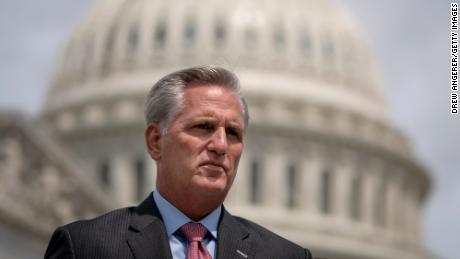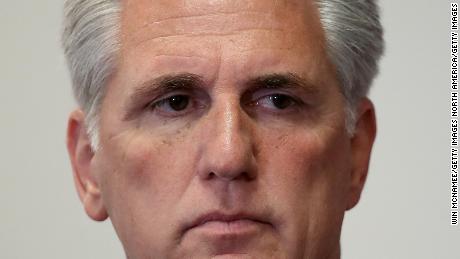Democrats aim to avoid a Jan. 6 panel ‘circus’
While the plans for the committee are still in early stages, sources tell CNN that Democrats intend to make an effort not to turn it into a second round of impeachment, but instead use it to explore a range of issues that don’t all center on Donald Trump, even if the former President’s role, they argue, cannot be ignored.
The strategy underscores the political reality of a committee that likely won’t be staffed and completely ready to begin its work for weeks, as some staff will need to obtain security clearances in order to conduct their work. By then, Republicans and Democrats will be into the fall, when election messaging and the battle for control of the House of Representatives will be in full swing.
“I don’t get the sense that my colleagues worry this is going to be a circus,” said Rep. Peter Aguilar, a Democrat from California. “I give the speaker a lot of credit for picking Liz Cheney as a member to send that message.”
Aguilar argued that after just two meetings, the committee is united in following the truth and not letting politics dictate how it pursues its investigation.
“It’s not like we are throwing things at the wall and then saying let’s dial this back because we don’t want it to be political,” Aguilar said.
At this point, Aguilar said, many of the biggest conversations have been about staffing, logistics and where to go first.
Pelosi selected a series of Democrats for her committee who have experience taking on sweeping investigations and haven’t attracted internal ire for antics that could be seen as a distraction. The California Democrat also selected a group of members she has close relationships with and who hail from diverse political backgrounds, including more moderate members like Rep. Stephanie Murphy of Florida.
Select committee members met last week after Pelosi named them to the new panel, and then met virtually Wednesday to discuss strategy and make a plan for hiring staff. Sources say the timing of a first hearing is not yet determined, but Thompson said last week that it would likely be hearing from US Capitol Police officers about their experiences on January 6.
“This is not going to be Benghazi part two because that really was a political show, and this is extremely serious business getting to the bottom on the attack on America,” Raskin added.
Republicans have signaled they’re going to push the committee to scrutinize Pelosi’s role in securing the Capitol as the attack unfolded, as well as point to political violence involving far-left groups like antifa that occurred during last year’s protests of police brutality.
Last week, McCarthy said it was “shocking” that Cheney would accept a committee assignment from Pelosi, while accusing the speaker of playing politics with the select committee.
Democrats charge that Republicans have little to complain about when they opposed an independent commission.
“Republicans have a tough case to make, because they voted down an independent commission that would be evenly divided between the parties,” said House Intelligence Chairman Adam Schiff, a California Democrat who is on the select committee. “But the underlying message is they don’t want an examination of what happened on January 6.”
Democrats have said they could call Trump to testify. Key Republican members could also be sought, including McCarthy and others who spoke to Trump as the insurrection unfolded. Those requests might spur lengthy court battles that could drag out the select committee’s work.
But Democratic sources tell CNN there will also be a focus on a number of other outstanding questions, including how the Capitol was so ill-prepared for the insurrection and how some of the insurrectionists were able to navigate the Capitol, including finding the location of Rep. Jim Clyburn’s office.
While the agreement for an independent commission would have required the investigation to wrap up by the end of the year, Pelosi and Thompson have not put a timeline on the select committee’s work.
Susanne Sachsman Grooms, a former House Oversight Democratic aide who helped with the formation of multiple select committees, said there’s often a lag in getting new committees off the ground because of the logistical challenges that come with it.
“The first step is staffing up, and then they will want to get out document requests, because responding to them takes the longest,” said Grooms, who is now a partner at Kaplan Hecker & Fink. “I can imagine there will be some months gap in time before they get to a place where you could have a hearing.”
![]()








